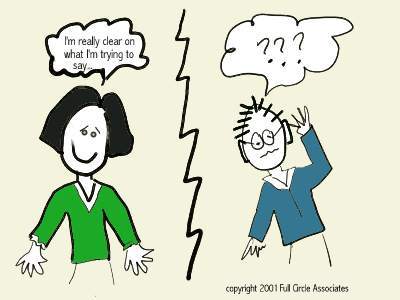With more and more information, and noticing that much of it travels in circles, there’s both “information overload” and “separate information worlds”, causing the communication of ideas to lose resilience. They’re barriers to communication, and can easily turn into “worlds of miss-information” leading everyone in them astray.
there’s both “information overload”
and
“separate information worlds”
CLAY JOHNSON has good links and discussion on the problem , relating to his interesting “Information Diet” book and “Information Diet Pledge“. By self-selecting our information sources we can create a world of miss-information for ourselves, so he suggests some rules for a healthy information diet. I wrote him the following comment on the “next steps” his “Information diet remainders“. Below that is my comment on his radio program on WNYC on 2/9/12.
_______
Clay, There’s an easy step beyond noticing that no one is really the author of information that travels in circles. It’s seeing that the author is really the social network it develops in, using the information as part of a social story of one kind or another.

The next step is noticing that such authoring social networks and cultures invent rather strongly held circles of storytelling, which are very different from each other’s. They become the “reality” the culture creates and form “silos” of thinking that people in them are then structurally separated from others by.
How strongly our cultural story-worlds are makes what they know of as “knowledge” into a private social construct. How strongly held and different those private realities can be, and how evidently disconnected from the natural world’s common stories, is a further intrigue, and today evidently a grave danger to us.
It takes effort for disparate cultural languages to learn to “speak to each other”. We’re being force to learn how, though, by all the great cultures on earth coming into conflict, as we exhaust the limits of the earth. I think it means we should address the larger “disconnect” problem too, how our cultures of “knowledge” don’t recognize the circular stories of nature, as the common “realities” for all human cultures.
The circular stories of nature, that no human is the author of, can be observed as “systems that take care of themselves”, like human cultures. Many kinds can be directly recognized that way, and there are scientific techniques for it too. They could *potentially* become points of common attention and sources of meaning that all cultures might discover, as of importance to them both separately and together.
___________
On Clay’s discussion on “Information Diet” on the Brian Lehrer radio show
Great topic for a natural systems scientist. Thanks to Clay and you for bringing it up. How people simplify “information overload” frequently ends up as “empty thinking” is a problem for living in an ever more complex society.
From a conversation systems view the “diet” idea really boils down to whether you’re getting support for you views from “inside the loop” or by poking around the environment “outside the loop”.
All cultures, whether it’s the conversation network that created the housing bubble (that crashed our world), or social movements of any other kind, all are the creation of the “social circles” organized around loops of a self-affirming conversation. They’re the source of all our common beliefs serving as our “cultural realities”.
That includes how we trust our affinity group for our personal beliefs, whether it’s which God to believe in, having faith in “the infinite earth” or at least “infinite uncertainty” theory of endless growth. They’re also the way people lose track of how to check “assumed facts” for themselves, either knowing how to find the sources or from their own direct observations. So in those ways, they’re truly an “abandonment of reason” at the same time each person’s affinity group is the center of our lives.
As suggested, it’s both one of the core features of human culture, and a source of all the manias of human history. “Mania” is itself a word for one form of misplaced social reality, created and sustained by a self-affirming circle of conversation.
One of the enormous gaps visible today is between 1)the world consensus idea that “restoring growth” is the key to prosperity and 2)the physical certainty that an exceptionally broad range of our essential affordable resources are being exhausted ever more rapidly by that.
There are quite a few other very instructive examples I might suggest you study. The large scale one is how we developed the whole belief system and institutions for modern society in an environment we no longer have. We developed “the American dream” and our scientific, finance and business habits during the years when the people generally prospered from being ever more productive in consuming the limitless resources of the earth.
Now our whole society appears confused by the increasingly prohibitive complications of that. Interestingly, there are lots of aspects of our personal lives where we respond to growth limits in our personal environments, with true skill and grace, that would have lots of lessons to apply to the areas of life where we’ve lost touch with how to do that.
_____
m.n.
